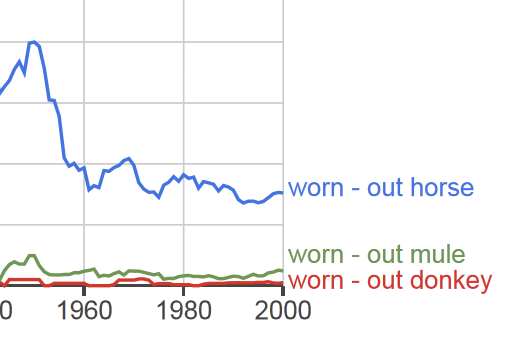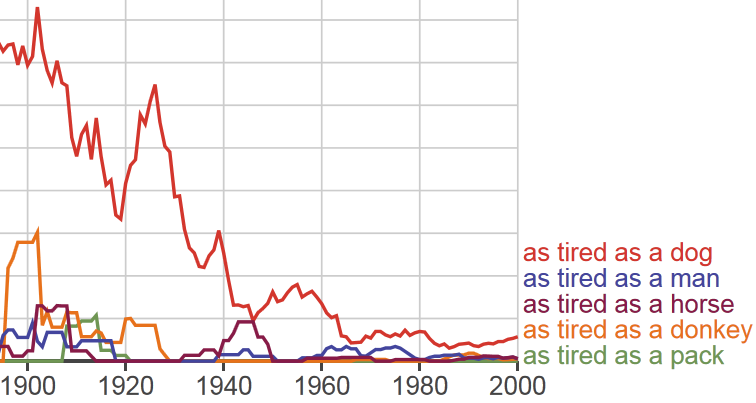Example:
That man is as tired as a [...] donkey.
I thought of the word overridden but I think it means something else.
Example:
That man is as tired as a [...] donkey.
I thought of the word overridden but I think it means something else.
If you don't mind using a term usually confined to British English, try knackered. From TheFreeDictionaryOnline.com:
knackered adj
1. exhausted; tired out
2. worn out; no longer working, esp after long or hard use
A common adjective would be worn-out. (as in worn-out donkey).
(Of a person or animal) extremely tired; exhausted:
http://www.oxforddictionaries.com/us/definition/american_english/worn-out
Note: Worn-out horse is more common than worn-out donkey. Personally, I heard or read worn-out horse more than worn-out donkey also.
Below Ngram comparison ( between worn-out horse, worn-out donkey, worn-out mule) might give an idea also but it doesn't prove how widely accepted the terms are in general:

Example:
Under fire, he "hugged the ground more than once," fatigue knocked him out, and sometimes he collapsed like "a worn-out horse."
[Under the Bombs: The German Home Front, 1942-1945 By Earl Ray Beck (1986)]
As an additional information, it is more common to use "as tired as an <animal noun>" phrase without using an adjective before the animal noun. Though, it seems like this usage has fallen dramatically. Dog is still more common than donkey or horse.
Below NGram comparison might give an idea also: (Note: I searched as tired as a *, asterisk character is a wildcard. I tried searching tired as a * donkey or tired as a * horse but I didn't get any results.)

As Mari-Lou A suggested in the comments, dog-tired is more common than any of these as an animal-related term to indicate exhaustion.
Old worn-out nags used to be called jades. Jaded might be a good word, depending on your context.
Another word for worn out is spent. The Free Dictionary includes multiple references to being exhausted, depleted of energy, tired, and worn out.
You could use hackneyed, pronounced /ˈhæknɪd/. Here are two senses for it:
- Used so frequently and indiscriminately as to have lost its freshness and interest; made trite and commonplace; stale.
- Habituated by much practice, experienced; sometimes with the ulterior idea of disgust or weariness.
Hackneyed is especially appealing due to its obvious derivation from hackney, a word used since Chaucer and before for equines of a middling nature. It was later were used for equines available for hire, as in a hackney horse, hackney ass, hackney mule, all given by the OED. Using the word hackneyed lends connotative weight to the sense of something that’s now in a bad way as a result of having been used so much over its lifetime of service.
For alternatives, there is also the compound adjective time-worn, which means:
Worn by process of time; impaired by age.
For simpler terms, you could also turn to shabby, tired, worn-out, run-down, or broken-down. Those should work just fine as well. Maybe even disused (but see below for the noun desuetude).
For longer, more Latinate terms, decrepit might work too, but probably not dilapidated except in figurative use since it has no stones to lose. The uncommon noun desuetude in common use means:
The condition or state into which anything falls when one ceases to use or practise it; the state of disuse.
And has come to have a legal meaning as well. But if you write that your donkey has lapsed into desuetude, many readers will have to look the word up. :)
All definitions taken from the OED.
Spavined. Per free college dictionary:
Adj. 1. spavined - (of horses) afflicted with a swelling of the hock-joint unfit - not in good physical or mental condition; out of condition; "fat and very unfit"; "certified as unfit for army service"; "drunk and unfit for service" Based on WordNet 3.0, Farlex clipart collection. © 2003-2012 Princeton University, Farlex Inc.
But when I've seen this word used in a literal sense, it's almost always applied to horses. You might see a reference to something else, like stairs, being spavined, but that's a metaphor drawing upon the veterinary term.
Another option that could work in place of over-ridden is "foundered".
From http://www.thefreedictionary.com/foundering:
foun·der 1 (foundr) v. foun·dered, foun·der·ing, foun·ders
v.intr.
- To sink below the surface of the water: The ship struck a reef and foundered.
- To cave in; sink: The platform swayed and then foundered.
- To fail utterly; collapse: a marriage that soon foundered.
- To stumble, especially to stumble and go lame. Used of horses.
- To become ill from overeating. Used of livestock.
- To be afflicted with laminitis. Used of horses.
v.tr. To cause to founder.
n. See laminitis.
[Middle English foundren, to sink to the ground, from Old French fondrer, from Vulgar Latin *funderre, from *fundus, *funder-, bottom, from Latin fundus, fund-.]
In this particular instance road founder would be the cause of an animal that was ridden too much and it applies specifically to horses/donkeys.
A donkey or horse that has been ridden out is hobbled.
hobble (definition from Merriam-Webster)
- to walk with difficulty because of injury or weakness
- to slow the movement, progress, or action of (someone or something)
It's clear there's no cliche answer to this question, though I would support "worn-out" as the most apt and common description of a donkey that's been ridden too much. But if there's no cliche, and we are committed not just to common and correct usage, then why not go with something more interesting:
busted
As in: "The man is as tired as a busted donkey."
Please don't respond by saying that "busted" only applies to machines, equipment, and other inorganic things.
How about dilapidated?
That man is as tired as a dilapidated donkey.
dilapidated (definition from Merriam-Webster)
- in very bad condition because of age or lack of care
In the synonyms there was also moth-eaten. 'That man is as tired as a moth-eaten donkey' sounds pretty sonorous to me, but it might not be the most common expression!
I might go for swaybacked. Technically speaking, it just refers to having an abnormally hollow or sagging back, but it carries the connotation that the swayed back is due to overloading and overwork.
Well-worn implies some physical deterioration. Haggard implies more severe deterioration. I don't think there are nouns that describe what you're thinking, only adjectives.